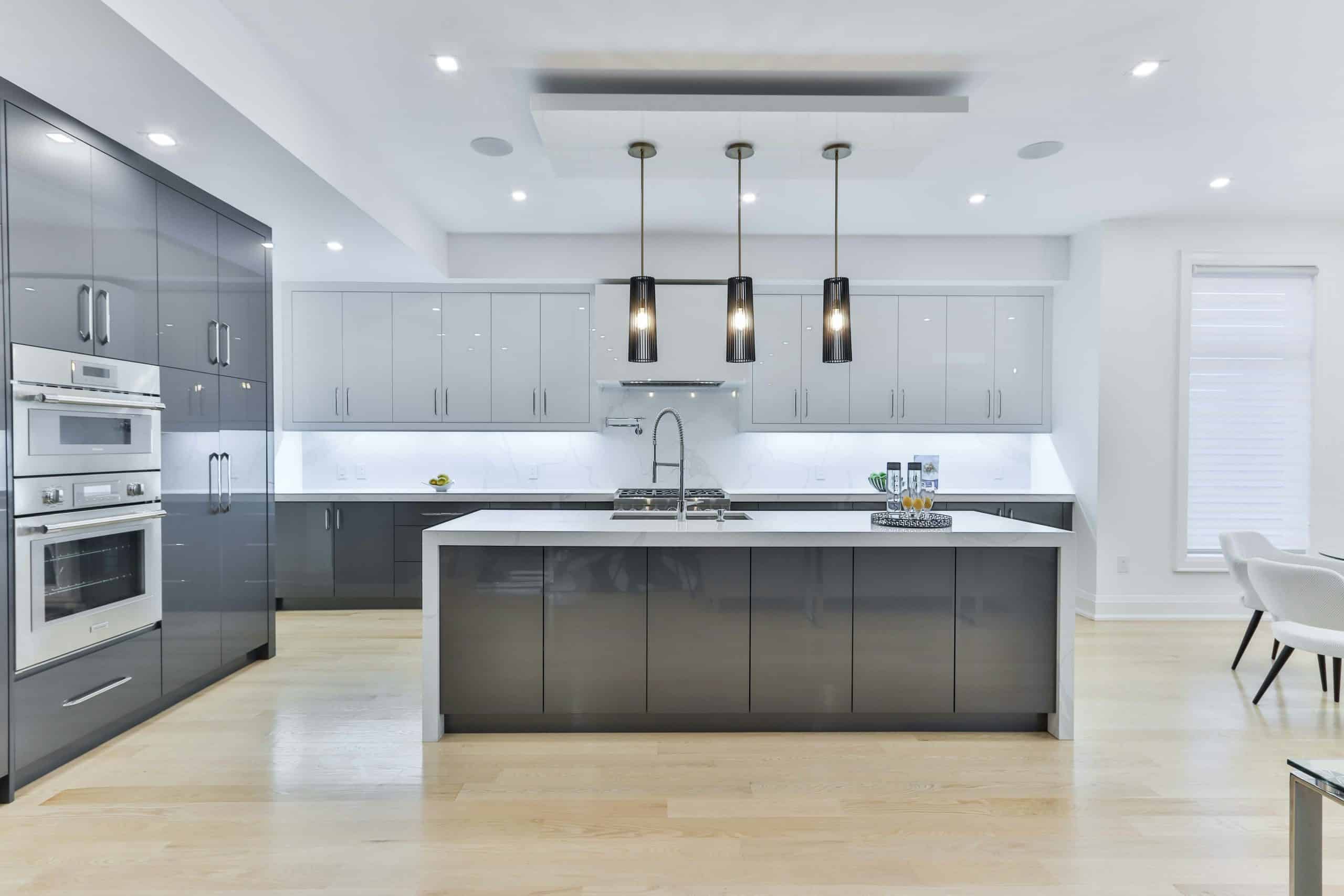What are the best ways to incorporate technology into kitchen design?

As we get closer to the end of 2023, the image of the kitchen as a purely functional space for cooking is becoming more and more outdated. Today, the modern kitchen is a multi-purpose hub of activity in the home, where food preparation is just one of many tasks that take place. Now, kitchens are also places for socializing, working, and entertaining. This shift has a lot to do with the smart technology that is increasingly being incorporated into the kitchen space.
The Role of Smart Technology in Modern Kitchen Design
Smart technology is not just about including high-tech appliances in the kitchen. Instead, it entails a complete redesign of the kitchen space around technology, to create a streamlined, efficient, and pleasant environment. This involves a careful consideration of various factors such as lighting, storage, and control systems, each of which can be enhanced by smart technology.
Avez-vous vu cela : What are the best home automation devices for the elderly?
Let’s explore some of the ways in which you can incorporate smart technology into your kitchen design.
Smart Appliances Are Changing The Way We Cook
Smart appliances are one of the most visible ways in which technology has invaded the kitchen. The offer of smart appliances that will help you save time and add convenience to your cooking process is considerable. This includes smart ovens that can be preheated remotely, refrigerators that can order groceries when you run out, and dishwashers that can sense the level of dirt on dishes and adjust their cleaning cycles accordingly.
Lire également : How to choose the perfect backsplash for your kitchen?
In addition, there are now appliances that can help you cook like a professional chef. For instance, smart stovetops can adjust the heat under your pan to ensure your food cooks perfectly every time. Similarly, smart ovens can control the temperature and cooking time based on the type of food you’re cooking. With these appliances, even amateur cooks can whip up restaurant-quality dishes.
Using Lighting Design to Enhance Your Kitchen’s Functionality
Lighting can make a big difference to your kitchen’s usability and ambiance. With smart kitchen lighting, you can customize the intensity and color of the light to match your mood or the task at hand.
What’s more, smart lighting can also help you save energy. By using sensors and timers, your kitchen lights can turn off when nobody is in the room, or dim during daylight hours. Some smart lighting systems can even learn your habits over time and adjust their settings accordingly.
Improving Storage with Smart Solutions
Smart storage solutions can help you make the most of your kitchen space. For instance, there are now smart cupboards that can keep track of the food you have stored and remind you when it’s time to restock.
Moreover, there are smart storage systems that can optimize the use of space in your kitchen. These systems can adjust the height and position of shelves and racks to accommodate different items, making your kitchen more versatile and efficient.
Bringing Control into the Kitchen Space
Finally, the concept of control is a key element in smart kitchen design. Today, you can control almost every aspect of your kitchen from your smartphone. This includes everything from adjusting the temperature of your refrigerator to turning on your dishwasher.
Moreover, with voice-controlled assistants like Alexa or Google Home, you can do all this without even lifting a finger. Simply say a command, and your smart kitchen will respond.
In Conclusion
Incorporating smart technology into your kitchen design can transform your kitchen from a simple food preparation space into a high-tech hub of activity. Whether it’s through smart appliances, lighting, storage, or control systems, technology can enhance your kitchen’s functionality, efficiency, and attractiveness. As we move further into the 21st century, smart kitchen design is set to become the norm rather than the exception. So why not get ahead of the curve and start planning your smart kitchen today?
Advanced Health and Wellness Technologies for Kitchen
The concept of health and wellness is increasingly becoming a critical component of kitchen technology. Today, appliances aren’t just facilitating cooking, but are also helping users make healthier food choices. For instance, smart fridges can now monitor the freshness of your food, alerting you when something is about to expire. This not only helps in reducing wastage but also ensures that you consume fresh produce.
Smart blenders and juicers can analyze the nutritional content of your drinks, helping you keep track of your daily intake of nutrients. We also have smart scales and nutritional scanners that can provide accurate dietary information about the food you’re about to consume, promoting mindful eating habits.
Some smart appliances even come with integrated recipe apps that offer a plethora of health and wellness recipes. These apps can connect to your smart fridge, suggesting recipes based on the ingredients you have, thus minimizing waste and providing healthy meal options.
The role of technology in promoting wellness doesn’t stop there. We’ve got smart trash cans that can sort and manage waste better, contributing to a greener planet. Then there are smart faucets that can ensure we use water efficiently, conserving one of our most precious resources.
In essence, the modern kitchen designer isn’t just creating a cooking space, but a platform that encourages a healthier and more sustainable lifestyle, all thanks to the advancements in technology.
Modular Kitchen: A Smart Solution for Small Spaces
For those with limited space, incorporating technology into kitchen design might seem challenging. However, with the rise of modular kitchens, even a small kitchen can become a tech kitchen powerhouse.
Modular kitchen design involves the use of pre-made cabinet parts that can be assembled in a variety of ways to fit the user’s space and needs. This design idea allows you to create a high-tech kitchen that is both efficient and space-saving.
For instance, a modular kitchen might include foldable counters that can be tucked away when not in use or adjustable cabinets that can be repositioned as needed. There are also compact, multi-purpose appliances that take up less space but still offer the benefits of smart technology. For example, a combination oven can function as a microwave, a convection oven, and a grill, saving precious counter space.
Furthermore, modern kitchens are also incorporating smart furniture into their design. We have tables with built-in induction plates for cooking, chairs with embedded speakers for entertainment, and countertops with integrated charging ports for your devices.
In a modular kitchen, every aspect is meticulously planned and designed with a focus on functionality and effectiveness, creating a space that is not only technologically advanced but also aesthetically pleasing and space-efficient.
Conclusion
The idea of a smart kitchen is no longer a futuristic concept but a reality of today. From high-tech appliances that simplify cooking to smart lighting systems that set the atmosphere, and from advanced health and wellness technologies that promote healthy eating to modular kitchen designs that maximize small spaces, technology has indeed revolutionized kitchen design.
As we look at the trends, the integration of technology into kitchen design is set to increase, with a focus on improving the efficiency, functionality, sustainability, and aesthetics of the space. So, whether you’re a professional kitchen bath designer or a homeowner looking for some design ideas, embracing smart kitchen technology is the way to go. After all, the kitchen of the future is here, and it’s smarter than ever!
